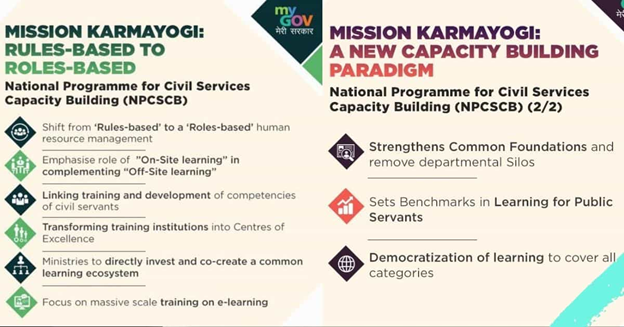Mission Karmayogi for civil services capacity building
- Posted By
10Pointer
- Categories
Polity & Governance
- Published
3rd Sep, 2020
-
-
Context:
The programme sets competency goals for each role in the government services, allowing for better skill monitoring.
-
BACKGROUND
- Touting it as the largest capacity building programme for civil servants in the history of India and of the world, the Union government announced Mission Karmayogi that promises to build well-rounded professionals who “can stand up to the expectations of the people.”
- Apart from setting competency levels for each role, programme also seeks to enhance skills of civil servants by allowing them specially-designed courses.
- The programme will be open to civil servants across all sections on a country-wide scale and will help them in performing their role better by establishing standardised competency levels for each role.
- In order to meet present-day challenges, “a civil servant has to be imaginative, innovative, proactive, polite, transparent, tech-oriented and creative” all at the same time.
-
What is the Objective?
- The ultimate goal is better delivery of government services and to reduce the gap between the citizens and the government. The programme, through efficient capacity building, aims at better ease of living and greater ease of doing business.
- This apart, it also provides the government as well as civil servants insights on their capacities and competencies.
-
Why there is a need for Karma Yogi?
- In a country where implementation of policies is a major hurdle, setting competency goals for civil servants will enable them to understand their role better and serve the people better.
- Fragmented Learning:Present day training landscape is diverse and fragmented, leading civil servants to think departmentally and in silos. Since thinking is parochial, there is a lack of a shared understanding of India’s national developmental aspirations and needs.
- Lack of continuous learning : While courses are offered in patches for civil servants, there’s an absolute lack of a lifelong-learning environment. There is a need to view training and learning as a continuous process and not something that is done in bits and pieces.
- Redundancy & duplication of efforts: Since the learning process is fragmented and department-wise, there’s duplication of effort and there is an absence of common shared knowledge and faculty.

-
What are the focus areas?
- The government feels that there’s too much of focus on rules at the moment and wants to shift the attention away to stressing on role. Under this each role has been divided into functions and activities and a competency level has been set against each.
- Competencies are further divided into domain, functional and behavioral aspects for the role to be better understood and thereby better served.
- Additionally, a digital platform named iGOT has been set up which would offer learning content from across the world as well as from home.
- Since this is a digital platform, it would enable the civil servant to measure her career growth by keeping a track of the number of courses that a civil servant takes.
- There will be more focus on 'on-site learning' in complementing "off-site learning". There will be more focus on e-learning.
-
What are the Components of the programme?
- HR Council:The programme will be headed by a National HR Council chaired by PM Modi. It will include select Union ministers, chief ministers, national-international experts, and thought and industry leaders. It will provide direction and oversee capacity building plans.
- Capacity Building Commission: The commission will establish testing standards and help the HR council with reports and recommendations on capacity augmentations and development of a comprehensive national training programme. It will create shared faculty and resources and have supervisory role over all central training institutions.
- SPV: The special purpose vehicle will be a 100 percent government-owned company, which will be responsible for managing digital resources and curating the best of courses from the world and India and offer it to civil servants for a subscription of Rs 431. Around Rs 510 crore will be invested in over a period of 5 years.
Conclusion:
Hence, Mission Karmayogi will shift the focus from rule-specific to role-specific. The project will provide a mechanism for continuous capacity building, a constant updating of the talent pool, and an equal opportunity for personal as well as professional growth and esteem of self-training for value addition at all levels.
